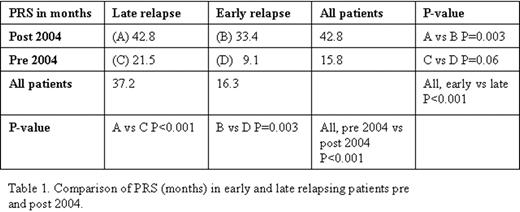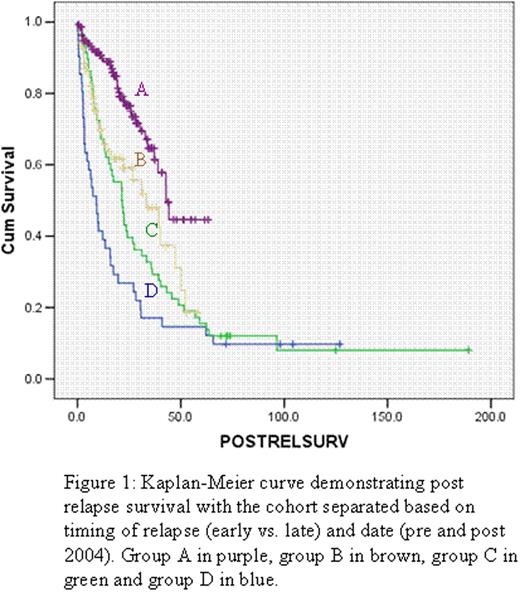Abstract
Abstract 2872
Poster Board II-848
Relapse within 12 months of stem cell transplant is an important clinically relevant prognostic factor predicting poor outcome for patients with multiple myeloma (MM). Little is known about the use of novel agents (NA) in this setting and their impact on survival. In British Columbia autologous stem cell transplantation (ASCT) as a part of initial treatment is the standard of care for patients who are eligible. The use of NA is largely restricted to the relapsed setting thus providing a large cohort of patients to assess the impact of these drugs.
We reviewed our experience with 418 patients with MM treated with ASCT diagnosed between 1985 and 2008. 307 have relapsed. Although thalidomide was available starting in 1999, the other novel agents, bortezomib and lenalidomide, were not available until after 2004, permitting division into two groups before and after Dec 2004.
The cohort was separated into four groups based upon year of relapse (pre and post 2004) and remission duration post ASCT. Early relapse was defined as recurrence within 12 months (m) of ASCT. Four groups were defined: Group A, late relapse after 2004 (n=138); B, early relapse after 2004 (n=70); C, late relapse before 2004 (n=58); D, early relapse before 2004 (n=41). We examined the impact of NA exposure on post relapse survival (PRS).
Median overall survival from diagnosis of myeloma of the whole cohort was 79.9 months (95% CI; 70, 89). Median PRS was 31.0m (95% CI; 25, 36). Exposure to novel agents conferred a better PRS (35.7m, 95% CI; 30, 42 vs. 9.1m, 95% CI; 4, 13; p < 0.001). Results comparing the various groups are summarized in table 1. Kaplan-Meier curves of the four groups are shown in figure 1.
Post relapse survival for patients with MM treated with ASCT has improved with the introduction of novel agents. Although relapse within 12m of ASCT remains an important clinical prognostic factor predicting worse outcome, the introduction of bortezomib and lenalidomide after 2004 correlates with a 24 month improvement in post relapse survival in these patients.
Connors:Roche Canada: Research Funding.
Author notes
Asterisk with author names denotes non-ASH members.



This feature is available to Subscribers Only
Sign In or Create an Account Close Modal